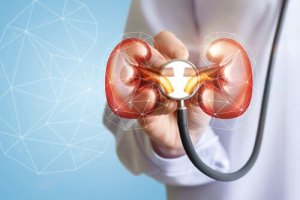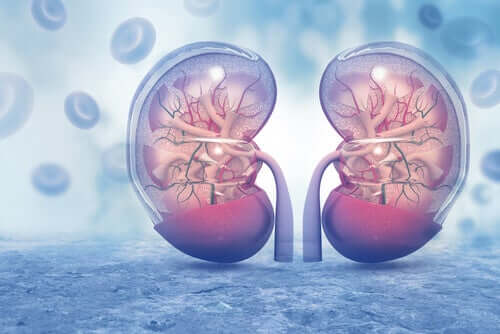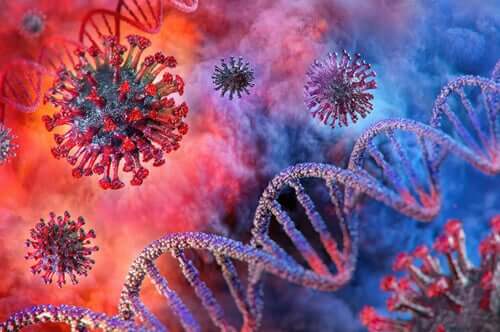How COVID-19 Affects the Kidneys


Written and verified by the doctor Leonardo Biolatto
Knowing how COVID-19 affects the kidneys has been added to the list of questions that the scientific community is asking regarding the development of this illness. Experts are discovering new symptoms every day, as well as new complications that result from the illness.
The question appeared when patients developed a condition known as acute kidney injury during their hospital stay. At that point, Chinese doctors started to wonder how COVID-19 affects the kidneys. So, working hypotheses arose that research went on to corroborate or discard.
Currently, there’s still no clear mechanism. However, nephrologists agree that SARS-CoV-2 is responsible for a certain level of kidney damage which varies in its frequency. While some geographic regions have reported less than 1% of patients with acute kidney injury, other countries speak of incidences of up to 30%.
Patients who suffer damage to their kidneys from COVID-19 have the worst prognosis. Acute kidney injury is difficult to treat in intensive therapy units.
Scientific studies on how COVID-19 affects the kidneys
At the beginning of the coronavirus outbreak in China, there was a series of scientific publications warning of kidney damage from SARS-CoV-2. Some based their studies on a small number of patients, while others were able to include almost 1000 individuals.
One of the initial publications looked for the incidence of acute kidney failure in patients with coronavirus. Acute kidney failure is the inability of the kidney to carry out it’s filtering functions.
In the said study, up to 9% of patients experience kidney failure. This translates to the presence of proteinuria, or the loss of proteins through urine. There’s also an elevation in a substance called creatine in the blood, which turns into a toxin when it surpasses a certain amount.
Patients with this condition underwent a tomography of their kidneys. The resulting images revealed that 100% of them showed alterations in their kidneys. Mainly, there was inflammation and an accumulation of liquids.
Another pioneer scientific study about the effects of COVID-19 on the kidneys also came from China. In this study, researchers found kidney failure in 3% of hospitalized patients. At the same time, they found a 40% incidence of hematuria, which is the presence of blood in a patient’s urine.

Keep reading: Hematuria: Symptoms and Causes
The three factors of kidney damage caused by coronavirus
We could say that there are three aspects to consider when it comes to how COVID-19 affects the kidneys. These factors can act alone or together, varying their presence in each patient. Sometimes the damage by SARS-CoV-2 is direct and, in other cases, damage occurs indirectly as a result of treatment.
The three factors are:
- The virus itself: Nephrologists agree that kidneys are one of the organs that this illness attacks, along with the lungs. The respiratory and the renal systems have substances in common, including renin and angiotensin. These substances are links by a receptor, which could be the protein that SARS-CoV-2 uses as a port of entry into human cells.
- Systemic symptoms: When a serious form of COVID-19 presents itself, many organs suffer the effects of the body’s failure. Something similar occurs when pneumonia results from other causes, which can lead to kidney failure due to a cascade of effects.
- Treatment: While there’s no completely effective treatment protocol for coronavirus, scientists are researching alternatives with a variety of pharmaceuticals. Among them, there are some that have adverse effects on the kidneys and can, themselves, lead to kidney failure.

Discover more: How Coronavirus Infects Cells: The Latest Stunning Images
How does COVID-19 affect the kidneys?
The theory of how SAR-CoV-2 enters the body is based on the knowledge that scientists have regarding how coronavirus infects the cells of the lungs. We know that the key to entry for the coronavirus is the protein ACE2.
The virus can enter the cells of the lungs because the spicules of the virus’s surface coincide in part with ACE2. This is a receptor that all human beings possess. ACE2 is also a protein that’s present in the kidneys and intervenes in the regulation of arterial pressure.
The regulation system that we’re referring to is the renin-angiotensin system. It’s one of the strong points of the treatment of arterial hypertension with pharmaceuticals. For this reason, experts also suspect that hypertensive patients have a higher mortality rate in this pandemic.
It turns out that the kidneys also possess similar proteins, given their participation in the same renin-angiotensin system. The hypothesis that COVID-19 could follow a similar route in the kidney cells as it does in pulmonary cells is under consideration.
Kidney patients are a risk group when it comes to COVID-19
It should remain clear that patients with kidney disease are among those who are at greater risk during this pandemic. Because of this, they should practice extreme caution and social isolation.
Furthermore, it’s crucial that they continue with their medication. If they need to consult a doctor regarding symptoms, then the doctor that receives them will need their complete medical history in order to implement the best course of treatment for their particular case.
All cited sources were thoroughly reviewed by our team to ensure their quality, reliability, currency, and validity. The bibliography of this article was considered reliable and of academic or scientific accuracy.
- Wang, Dawei, et al. “Clinical characteristics of 138 hospitalized patients with 2019 novel coronavirus–infected pneumonia in Wuhan, China.” Jama 323.11 (2020): 1061-1069.
- Naicker, Saraladevi, et al. “The Novel Coronavirus 2019 epidemic and kidneys.” Kidney International 58.3 (2020): 26-31. (2020).
- Zhen Li,, Ming Wu,+, Jie Guo et al Caution on Kidney Dysfunctions of 2019-nCoV Patients medRxiv preprint doi: https://doi.org/10.1101/2020.02.08.20021212
- Zhang, Haibo, et al. “Angiotensin-converting enzyme 2 (ACE2) as a SARS-CoV-2 receptor: molecular mechanisms and potential therapeutic target.” Intensive care medicine (2020): 1-5.
- Chen N, Zhou M, Dong X, et al. Epidemiological and clinical characteristics of 99 cases of 2019 novel coronavirus pneumonia in Wuhan, China: a descriptive study[J]. Lancet, 2020, 395[10223]: 507-513
This text is provided for informational purposes only and does not replace consultation with a professional. If in doubt, consult your specialist.








